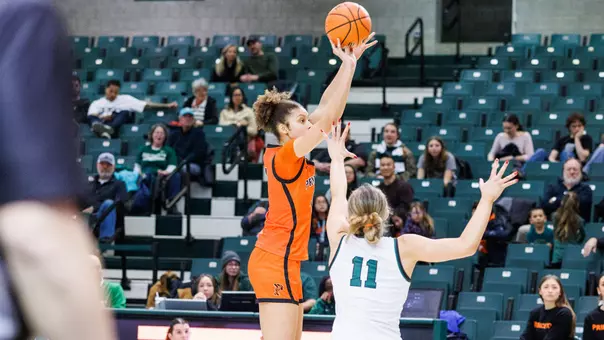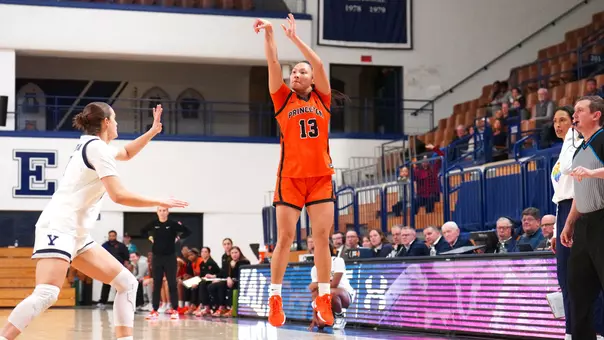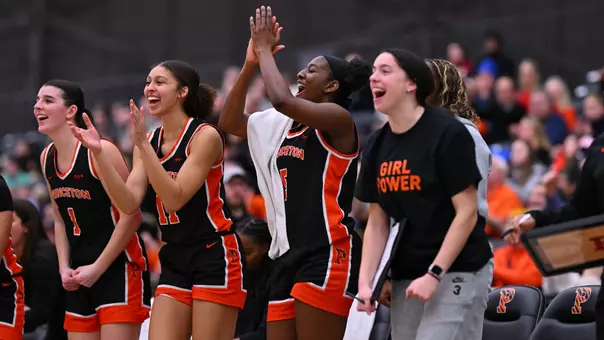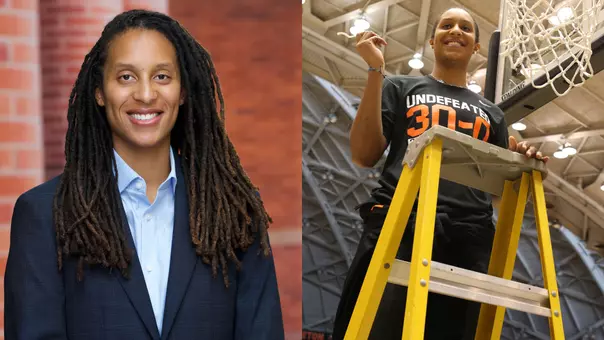Princeton University Athletics
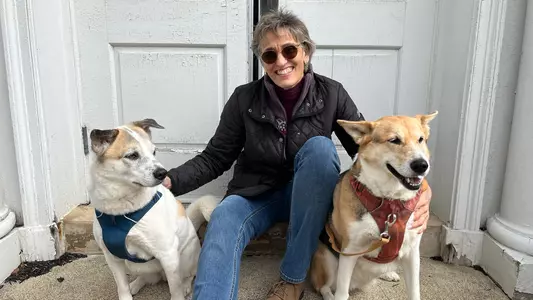
Feature Story: As Ellie Mitchell Chases Her Record, Maggie Benchich Roots Her On — And Remembers Her Own Days As A Tiger
March 12, 2024 | Women's Basketball
Her voice, raspy and fading, is betraying Maggie Benchich, and for that she is apologizing. She coughs, and then she coughs again. Her vocal cords, injured during a surgical mishap several years ago, can only handle so much, and now, 90 minutes into the conversation, she’s reaching that point.
Interestingly, though, during these 90 minutes, it’s not the voice that gives away where the wheel of emotions has landed on any given occasion anyway. No. It's her facial gestures that do that, and she seems to have a one to cover every emotion.
Sadness? The corners of her eyes show the slightest hint of a tear and her smile goes away. Happiness? The same smile goes ear-to-ear, or possibly even wider than that, if that is possible. Her best is when she has amused herself — in these moments she buries her face in her hands and laughs quietly.
As she spends 90 minutes going through her life’s story, the smile and head-in-hand moments far outweigh the blank face and almost-tear ones. Together they form a scorecard of her first 68 years, and she knows that, on points, she’s far ahead.
“I’ve been very blessed,” she says.
And it is because of that big picture that, without any thought that she’s trying to convince you, or perhaps even herself, otherwise, she can also say, another short sentence:
“It’s time.”
It is Maggie Benchich who smiles as she says that. She was Margaret Meier back in 1978, when she graduated from Princeton. For the last 46 years, the name “Margaret Meier” has sat in the top spot under “career rebounds” in the Princeton basketball record book, along with the number “1,099.” Ellen DeVoe reached 942 before graduating in 1986. Bella Alarie got as far as 964 before she graduated in 2020. From there, it dropped down to 860, from Niveen Rasheed. Only one men’s player, Bill Bradley, has ever reached 1,000 career rebounds, and he had 1,008. The most any men’s player has had since 1,099 became the record is 725, from Ian Hummer, Class of 2013. Next on the list in the last 46 years? That’s 605, from Spencer Weisz, Class of 2017.
And then, along came Ellie Mitchell. Like Benchich, Mitchell stands 6-1, as opposed to 6-5 or so. Also like Benchich, she seems to share the same attitude towards rebounding.
“Her belief is that every loose ball is hers,” Benchich says. “I love that attitude. I always felt the same way. Take no prisoners. That ball is mine. Whoever controls the ball controls the game.”
Mitchell has controlled Princeton women’s basketball games in a way that can’t really be quantified, even with her rebounding totals. She is ferocious. She clearly views her right to the basketball the way that Benchich did.
Now, as the Princeton women enter the Ivy League tournament this weekend at Columbia, Mitchell has 1,088 career rebounds, leaving her just 11 away from tying Benchich. Princeton has a minimum of two games left — at least one in the Ivy League tournament and at least one postseason game beyond that — and possibly more. For the last two seasons, Princeton has played two Ivy tournament games and two NCAA games.
Mitchell averages 9.6 rebounds per game. Given how long Benchich’s record has stood, and how nobody else has really come all that close, this could be a now-or-never situation.
“It’s time,” Benchich says. “Somebody was going to break it. It’s been there a long time, and I’m very proud of it, especially with how many great teams Princeton has had and how many great players have come through. And if somebody was going to break it, I’m glad it’s going to be Ellie. I love the way she plays.”
Benchich and Mitchell actually met recently, when Princeton had an alumni weekend for women’s basketball.
“It was a really special moment for me to finally get to meet Maggie,” Mitchell says. “I look up to her and everything she achieved during her career so much. It is an honor to even have my name mentioned in conversations with hers. I hope that when I graduate and finish my career with Princeton women’s basketball behind me, I can leave even half the legacy that she has left in our program.”
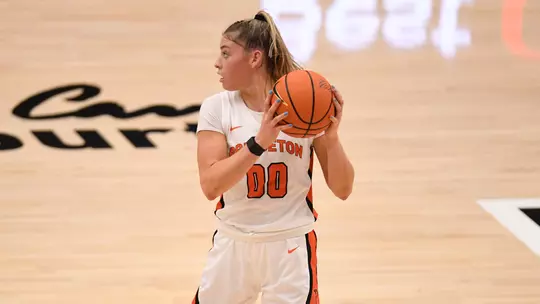
Before there was Tennessee or UConn or South Carolina, the first dynasty in women’s college basketball was put together by a small Catholic school for women outside of Philadelphia that wouldn’t go co-ed until 2005. Led by Hall of Fame coach Cathy Rush, the teams at Immaculata College became legendary in the earliest days of the women’s game, winning the first three AIAW national championships, in 1972, 1973 and 1974.
Pat Walsh is a 1972 graduate of Immaculata, and she then became what passed for an assistant coach under Rush, working all day as an elementary school teacher and then driving to help coach the team three afternoons a week. She also took the team, without Rush, who was pregnant at the time, on an Australian summer trip.
In the summer of 1974, Princeton’s Merrily Dean Baker, the first woman administrator for Princeton Athletics, was looking for a new women’s basketball coach to replace Penny Hinckley, who was also coaching field hockey and women’s lacrosse. Baker called Rush to see if she could make a recommendation, and her choice was Walsh.
“It’s not like there was a huge pile up of women’s coaching candidates in those days, and besides, I don’t think anyone else wanted it,” Walsh says, laughing.
She does that a lot. She is 75 now but doesn’t sound it. She speaks at a rate about twice as fast as Benchich, which is probably an incalculable rate quicker than most 75 years olds.
Walsh got married shortly after graduating from Immaculata, and her husband Bob — a member of the great 1968-69 La Salle College team that finished 23-1 and ranked No. 2 in the country — became a teacher and basketball coach in the Central Bucks school district in Southeastern Pennsylvania. He’d spend 50 years coaching the sport, first at all three Central Bucks High Schools and then as an assistant with the women's team at Cabrini.
Pat Walsh would spend five as a professional coach, all at Princeton, where she went 72-38. When she took the job in the first place, it was partly because she knew of a Central Bucks East student who was heading there to play basketball.
“When I got the job, my first thought was that Margaret was going to be there,” Walsh says. She’s always calls her Margaret. “I thought we could build a team around her. She was aggressive, knew how to score and knew how to use her body on defense. She was exceptional. We just let her go and do her Margaret thing.”
Is that it?
“She was very good at keeping the ball over her head.”
There’s a funny story about that.
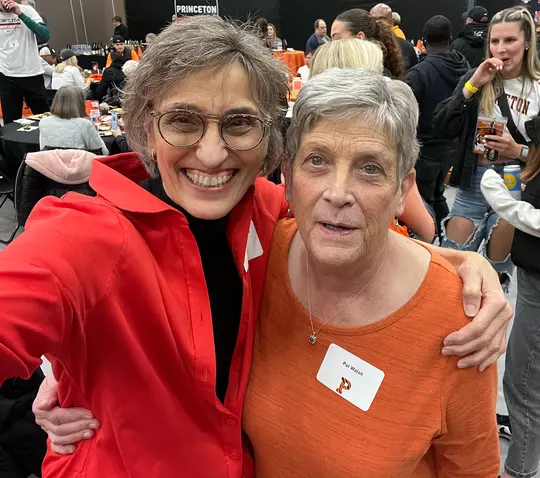
Margaret, or Maggie, grew up in Millburn, N.J., where there was exactly one sports opportunity for a girl at the time — gymnastics. She was actually pretty good at it, until she started growing, and growing. There are not, she says, a lot of 6-1 gymnasts out there.
When she was about to start ninth grade, she moved to Doylestown, Pa., and into the Central Bucks school district. To that point, her athletic experience outside of gymnastics was limited to playing baseball and basketball with her brothers. When she arrived at CB East, she had never played an organized team sport. As a ninth-grader, she sang in the choir. It wasn’t until 10th grade that she tried out for the girls’ basketball team. Of course, she had no idea how to play the game.
Here is one of her best “bury her face in her hands” stories:
“So this is one of the most humiliating things that ever happened to me,” she begins. “I went out for the team, and like I said, I’d never played before. The coach liked my height, and she was trying to teach me to shoot. She ended up putting the shortest person on the team to guard me. Janet Dumay. I’ll never forget that. She was teeny, weeny. She was like 4-9 or something. I just towered over her. And she stuffed me. Here I was, over six feet, and she just stuffed me. The entire team roared with laughter. But you know what? I never brought the ball down again. That story sticks with me to this day. I, uh, ooooffff.”
Then she recoiled in horror. Then she laughed.
“My best friend, then and now, is Krista Reichard. She point-blank told me that every other player hated me because I was terrible at first but still made the varsity that year. I had to laugh. How many 6-1 girls did you see back then? But it was also very motivating. I went to a basketball camp, and I worked hard to become a better player.”
Someone taught her to shoot. She once scored 40 points in a high school game and made it into Sports Illustrated’s “Faces In The Crowd.” By the time she was ready for college, she was already the Philadelphia Bulletin's Player of the Year.
Where would she go to college? She figured she’d go to the same school that basically everyone in her family had attended: Lafayette. On a whim she applied to Princeton, and the result didn’t go well, at least at first.
Cue another episode of “Head In Hands:”
“Back then, Princeton would send you a letter that said your admission was either likely, possible or unlikely,” she says. “I got one that said ‘unlikely.’ That meant I had about a two percent chance of getting in. The letter came from Mr. Sanford. I didn’t like that, so I kept sending Mr. Sanford updates, any time I got a newspaper clipping or anything. As soon as I got a clipping, I’d stuff it in an envelope and send it off to Mr. Sanford. Then I found out that my high school actually made an error on my transcript. I had been sick for two months in ninth grade and had a few incompletes for work I made up, but they entered them as F’s. Once they fixed that, I thought I had more of a 50-50 chance. I was delighted when I got in.”
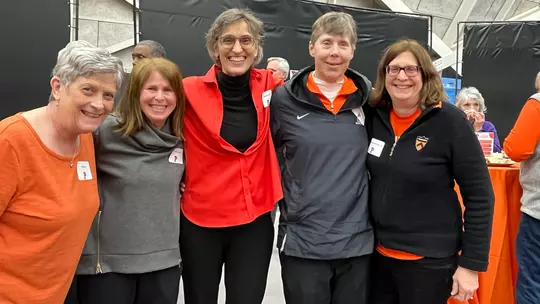
She came to Princeton in Year 4 of women’s basketball at the school. Princeton was 15-13 in the first three years, but the Tigers then started out a run of winning the Ivy League championship in each of the four years that Benchich was on the team, going 62-22 along the way. Her Princeton experience, though, might have been completely different had she not been on the basketball team.
“I was struggling academically,” she says. “I was insecure. I was feeling dumb. I wasn’t happy at all, and I was thinking about leaving. I was a fish out of water, and I felt ill-prepared academically. And then … basketball started. Princeton basketball saved my life. It kept me at Princeton. My teammates were the coolest women I’d ever met in my life.”
Her teammates included legendary early Princeton women athletes, names like Laura Drummond, Coz Crawford, Heidi Nolte, Pesky Walrath, Abby Rubenfeld, Janet Youngholm, Pat Harnisch, CB Tomasiewicz and Jackie Jackson. They were the ones who built the program from scratch.
“It was a time of growth in women’s basketball,” Walsh says. “When I see what it looks like today, I am amazed. I had one assistant, Janet Youngholm, in 1974-75 and then after that had another assistant, John Hershey, and he was mostly a volunteer. No one was taking our pictures or pushing for anyone to come see us play. We played for ourselves and drove our own vans. Our pregame meal was spending our own money at PJ’s Pancakes.”
Benchich would finish her career with 1,165 points to go along with 1,099 rebounds, which makes her, obviously, the only woman to finish with at least 1,000 of each, something that won't change even if Mitchell catches her rebounding record. Only Bill Bradley has done that for the men.
“These were all women who were amazingly strong, competitive, smart and a lot of fun.” she says. “Everything I needed was in basketball. After the first week, I never thought about leaving again. When I talk about it, I can feel how I felt back then, and it didn’t feel good until I started basketball. The team cohesion. The support from each other. I needed it.”
After graduation, Benchich had two vastly different career options: either take a job with IBM or go to the U.S. Navy Officer Candidates School. She chose IBM, where she would stay for 32 years and live in places like Akron, Philadelphia, Pittsburgh, Portland (the one in Maine), Rochester (the one in Minnesota), Poughkeepsie, White Plains, Armonk and then back to Philadelphia.
“I’ve never been bored a day in my life at work,” she says. The only person who limited me was me, and that’s how it should be.”
After retiring in 2011, she went back for a master’s degree in teaching history from Bard College. That’s when she first had the throat issue, which resulted in the surgery that left her with damaged vocal cords. With her teaching career over before it started, she went back to IBM.
As she runs through her career, she’s in the “smile ear to ear” phase. For instance, when she talks about Rochester, she says this:
“I thought I knew what cold was. We moved to Rochester on Jan. 1, and I had cold redefined. I had a dog who was a black lab, and it was so cold that I had to dig a trail and even then with my foot push her outside. That’s how cold it was. People in our neighborhood would put up Christmas lights in September. You had to. You couldn’t take your gloves off and then you can’t do anything. We rented a house when we first moved there, and there was a park right there. One day, when school was closed because of the windchill, my son had a friend over, and so I took my son and my other two kids and the friend and the dog and decided, stupidly, to walk down to the park. It was sunny, so it didn’t seem so bad. Then on the way back, the wind was in our face. I had four kids who were sobbing and a dog who laid down in the road and wouldn’t move. I was the only insane person outside. When we got home, I heard that the windchill was 68 below zero.”
Voice or no voice, she can certainly tell a story.
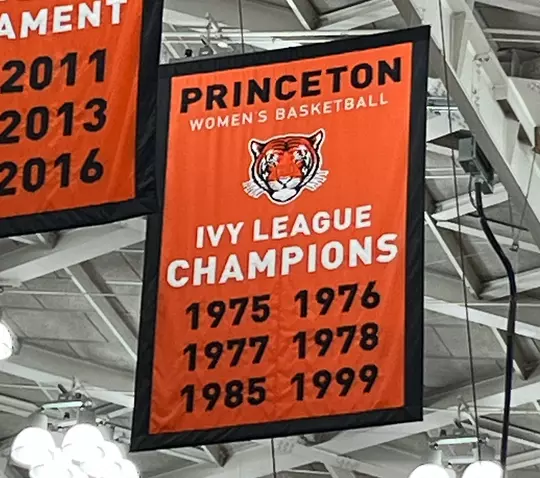
The wheel of emotions isn’t always a fair one, and so it is that Maggie Benchich does have her stories that bring out something other than a smile. When she tells these, her demeanor changes, and that tear starts to form.
In 1978, Maggie Meier and Jackson shared the Otto von Kienbusch Award as the outstanding senior female athletes. There was no banquet back then. The news came in a letter.
“That was my proudest accomplishment,” she says. “And it was even more important to me to share it with Jackie.”
Jackson came to Princeton from Meadville, on the other side of the state of Pennsylvania. She and Meier hit it off immediately, on the court and off. As teammates, they became the first Princeton women to reach 1,000 career points, as Jackson finished with 1,113.
While Benchich’s post-Princeton career took her around much of the Northeast United States, Jackson set off to see the world, spending her career as a missionary, mostly in Africa. Despite the distance, the emotional connection between the two never waned. During those years, Benchich and Jackson lost touch before reconnecting at their 40th Reunion in 2018.
Jackson passed away in October 2023, and it hit everyone who had played with her hard, especially Benchich.
Benchich and her husband had three children before they got divorced. It was then that she met Jeffery Benchich, with whom she would spend 12 years.
“He was my soulmate,” she says. “He was my true love.”
Jeffrey Benchich, sadly, passed away from lymphoma in 2017. He and Maggie had gotten married one month before his passing.
“I think about that man every day,” she says. “There are only a very small handful of people who had that kind of impression on me. He was such a great, compassionate person. He was very unselfish and very comfortable in who he was. He was never threatened by people who had opposite opinions. Jackie was the same way. You can feel instantly comfortable around someone like that. It’s so appealing. I miss them both terribly.”
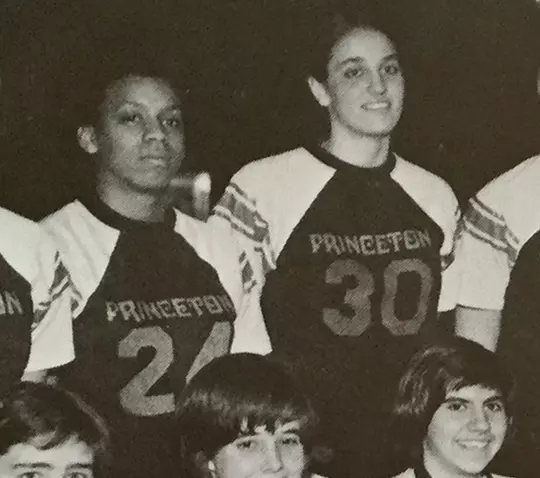
The Princeton women’s basketball team is, in many ways, in the greatest era in program history. It has won an NCAA game three times in the last eight years, including each of the last two. The Tigers have won six straight Ivy League championships.
They play all of their home games on ESPN+. Their uniforms are sharp. Each player has a locker stocked with sneakers, sweats, shorts and anything else they need. There is a nutritionist, a strength-and-conditioning coach, an athletic communications person who goes to every game home and away and chronicles their every movement on the team webpage and social media.
Their head coach is Carla Berube, who is as good a coach as there is in the country. She has a staff of three full-time assistants and a team Director of Operations.
The pioneers of Princeton women’s basketball have become quite attached to the current generation, even if they had hardly any of what this group does. Nolte and Youngholm do as much as anyone to keep everyone in touch, and there exists a wonderful connection between players in their 60s and players who currently play, as well as everyone in between.
“I love what Carla is doing,” Benchich says. “When we were there last time, we all got around in a circle, and Carla asked us all to tell about ourselves in 20 seconds or so, what our major was, what we’re doing now — even us oldsters.”
It was after that where she finally got meet Mitchell, the one who is chasing down that 46 year old record. As with everything else Princeton Basketball, Benchich is rooting hard for her and will be as happy as anyone to see her name slide down to No. 2 on the rebounding list.
“I have been super, super blessed in my life,” Benchich says. “I’m grateful to have been able to attend Princeton. I’m grateful for my family. And I’m grateful that I had the chance to meet women who will be a part of my life until I take my last breath. Princeton Basketball equipped me with what I needed to be successful in life. The game is much different now. They’re bigger. They’re stronger. They’re faster. They have more skills.”
Then it’s back to the head in the hands:
“You know, we didn’t really use weights much due to limited access to facilities, but we would take a lap around teh track to warmup. We had to run a mile before practice in under eight minutes, preferably seven. I thought we were in pretty good shape for women’s sports then, but Janet was an assistant coach my sophomore year and she made us run the stadium steps. Up. Down. Up. Down. Endlessly. I couldn’t even feel my legs. I thought I was going to drop.”
Then it’s another laugh. And then the apology.
“You certainly got me talking,” she says.
As she stands up, she doesn’t say much more. She still looks the part of a basketball player. She is tall, and it’s not hard to imagine that, long before Mitchell would terrorize every loose ball in Jadwin Gym, that this woman did the same.
And if you can’t imagine it, well, then listen to what her coach had to say.
“Margaret would still be exceptional today,” Walsh says.
“Rebounding, after all, hasn’t changed.”
— by Jerry Price





.png&width=24&type=webp)




